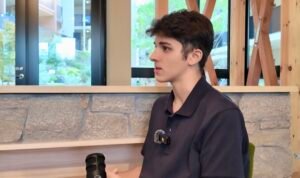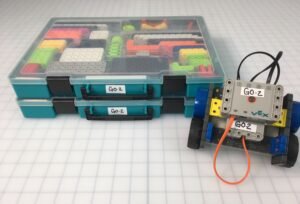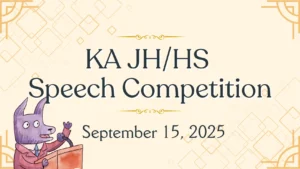Explore the dynamic educational offerings at the “International Education Fair Tokyo 2024 Autumn.” This video provides insights into how Tokyo’s international schools blend global educational standards with a deep respect for local culture. From personalized learning environments to specialized programs like the Dalton Plan and AP courses, discover how these institutions cater to the holistic development of students. The video highlights how schools encourage students to pursue their interests, engage in STEM and real-world problem-solving, and maintain a connection to Japanese heritage, all within Tokyo’s vibrant educational community.
Transcript
Please note: Clicking on the timestamp will take you to the start of their clip in the video. Clicking on the school name will take you to their website.
00:12-01:14 – Crimson Global Academy
Crimson Global Academy: (00:17) As a part-time student, uh, they can, you know, start from one subject. So, for example, we have APs. So those who go to uh, normal Japanese school, and if they’re good at math, they take Calculus AB or Calculus BC, AP or, for example, statistics or AP economics, macroeconomics, microeconomics, something like that. So for elementary school students or junior high school students, if they want to, you know, uh, strengthen their English skills, they take ESL classes where they can, you know, strengthen listening, speaking, reading, writing skills. So if uh, and even those those who go to international school, if they think their academics is not enough, they, you know, take primary or lower secondary or IGCSE classes to strengthen their um, for example, English, science or math skills. So, yeah, and you can start from one subject. So you can actually use our school as a Juku as well.
01:15-02:53 – Dalton Tokyo
Dalton Tokyo: (01:19) We’re a new school and we just opened in 2019. And our school is founded on the Dalton Plan, which was founded by Helen Parkhurst in America over 100 years ago. So, it’s a, it’s a very old philosophy and it has a lot of rich history. And as some of you may know, there’s a very famous Dalton school in New York based around, and there are lots of Dalton schools internationally that also are based around the plan. And the plan focuses really on freedom and cooperation, independent thinking, and is very student-centered learning. So students are free to pursue their own interests and really deepen their understanding and learning about things they are interested in. So we really want to install a love of learning and let them pursue their own interests and their own passions.
ISTimes Global: (02:11) Oh, that’s great. And what are some of those passions that they can pursue here either in the classroom or outside of the classroom?
Dalton Tokyo: (02:17) Well, we offer the a thing called Inquiry Lab, which different theme labs. So right, um, you know, as junior high school students, they don’t have a lot of experience and they’re not really quite sure which path they want to take. So we aim to expose them to a lot of different different things and different interests and passions and we have theme labs where they can take every Friday. And they sign up for things that seem interesting to them and they can challenge those and experience different paths that they can take.
02:54-03:49 – Global Indian International School
Global Indian International School: (02:58) I think in Japan now, uh, the parents want the kids to learn English. So they are more inclined towards international school. Then second is, of course, they get to choose between the curriculums, right? Because we have different curriculums. They have that option. Then it is a global school network. So our school is not only located in Japan, but different countries like Singapore, Vietnam, Korea. Uh, so if at any point they relocate, they get that seamless transfer to other countries or other parts of the school. And we not only focus on academics, but we have wide co-curricular activities also. So we have yoga, we have karate, we have ego origami. So I think these are the pretty few USPs of our school which bring the parents here.
03:50-04:34 – CTIS (Capitol Tokyo International School)
CTIS: (03:54) Most important thing is we invite the the professionals and also the entrepreneurs from different fields. Then we ask them to speak about their business to the to the children, to the students directly. And there are many chances for the students to think about the world and you know, the society. And they try to connect their studies and the the real things in, you know, our yeah.
ISTimes Global: (04:22) Do the kids have many opportunities to go outside of the campus as well?
CTIS: (04:28) Yes, they they also visit companies and different places and investigate things.
04:35-05:45 – EF Academy
EF Academy: (04:38) Yeah, so we have three unique schools located in Pasadena, New York, and Oxford. So each school is completely different. In Pasadena, we’re we have a very progressive high school that’s focused on project-based learning, as well as getting a US diploma. And in New York, we have an IB program as well as AP courses and a standard US diploma. And then Oxford is specifically for A-levels, so 11th and 12th grade students.
ISTimes Global: (05:11) And you come here to Japan because you’re not because you have a school here, but because you’re a full boarding school as well?
EF Academy: (05:20) That’s right. Yeah. We have found that it’s very popular in Japan for families to send their children overseas. And so what’s unique about EF Academy is that it is truly an international boarding school. So we have students from over 60 countries living on our campus and attending our schools.
05:46-07:48 – KAIS International School
KAIS International School: (05:50) The things that draw parents to KAIS, I think is the personalized learning, the personalized education that we offer. Especially with the small class sizes. As the middle school principal, I know all the families in the community. I’ve met with them face-to-face. I know all their students, I know their needs, and their strengths. And I think it’s that connection, it’s that understanding that, oh, if I send my child to this school, they’re not just going to be like a number amongst thousands. The whole experience is tailored and designed for their own kids. I think that draws a lot of people. That and we have especially like a caring atmosphere. Like I mentioned, they call us by our first names. A lot of effort is put into creating an atmosphere where the students are managed in a positive way, behavior is managed in a positive way. Learning is done in a fun and creative way. All these things create, they’re the building blocks to I think our school. And like one example of that, sorry if I go on go too long. One example of Gthat is in the middle of the week on Wednesdays, we don’t have a normal schedule, we have an elective schedule where all the hobbies and interests and the requests from students, we try to we try to create a a huge menu of elective classes from cooking, to chess, to table tennis, right? To there’s sports, there’s art, painting, and there’s also academic classes from philosophy, robotics, engineering. It’s just we go completely off curriculum every week and we bend that five-day work week monotony. So there’s this really special day in the middle of every week. Kids love that, parents love it. They learn a lot of skills that you don’t really get in the normal curriculums. I think that’s a huge, a huge point that keeps kids at our school.
07:49-09:13 – Middleton International School
Middleton International School: (07:54) So we started about 30 years ago and was started by a mother who wanted to provide a certain kind of education for young children. She wanted children to be happy, to be confident, to be enjoying their childhood rather than be, you know, asked to do things and, you know, fill out worksheets, etc. She wanted learning to be enjoyable and fun. So that was the original philosophy and we are quite happy that we’ve stayed on and we’ve committed to that philosophy over the years. So we start with children as young as infant care, go all the way to high school. And one of the reasons why families come back to us is because it is like a second home for them. The community is very, very important for us. Our students are boutique in size, but that also translates into a highly personalized level of conversation, communication, community with our families. The other reason why we feel families come to us, and we are a very international community, is because of the language provisions that we offer. So we are very committed to a bilingual foundation. So Chinese, Japanese, and other languages are a big part of our program. And we also have a very diverse range of nationalities. So we’re not really a British or American or Singaporean, we’re, you know, an international community of learners. So, be it in the nationality of our staff, be it in the nationality of the families who come to us, we’re very, very diverse.
09:14-10:50 – ISN (International School of Nagano)
ISN (International School of Nagano): (09:18) Most of parents are pretty amazed how much education, especially English acquisition, their children can learn and in the preschool. And then after that, when they’re happy with what they do and what how they are, they pursue their education in elementary school. So um, and we have all the unique like professional teachers around. And we basically spend a lot of time inquiring what they like, how they are, and then they boost confidence. I think children purely enjoy their time with their friends. And with that, higher motivation, they put some energy in academics. And then that’s why our children’s performing in their academics pretty high as well. It’s good that at any point end of the year, elementary school or middle school, they have a choice if they want to pursue different career, different school, they could do it in Japanese or English. If they want to keep their choices, they come to middle school, and then then finally, they usually apply for both Japanese school and then overseas school in high school. But it’s up to them which whichever they want to go.
10:50-11:44 – Laurus International School of Science
Laurus International School of Science: (10:54) We have a whole team of science specialist teachers. And also in our facilities, we have one science laboratory in each floor of our facility. So students can actually do real science project and science experiments. Also, we have long-term projects, short-term projects. And yeah, our students they it’s not just science, it’s also like we we emphasize STEM education. So students are actually trying to use the science knowledge that they learn to solve real world problem.
11:45-13:54 – Malvern College Tokyo
Malvern College Tokyo: (11:49) We have five buses. We have a shuttle bus that goes to Kokubunji station. But then the four other buses stop at either two or three stations. So we go as far as Azabu-Juban and Hiroo station. But also Yurakucho. But then we do more central like Shibuya, Meguro, Shinjuku, Yotsuya, Roppongi. Then we also go a little bit further south to Futako-Tamagawa and Chitose-Funabashi as well.
ISTimes Global: (12:12) Malvern College has so has so much history. If you come into the school, you first see the picture of C.S. Lewis. Yes. As of the many names. So how do you bring so much tradition and culture and history into the campus here in Japan? And yet, how do you also try to still connect to that Japanese community and that Japanese culture?
Malvern College Tokyo: (12:36) So, I think having that really strong connection to the UK school, not only through through our headmaster, Mike Spencer, but they come and visit us often. So the headmaster from the UK, just other also members and students from the UK will come and visit us. It’s really important to keep like the house system, which is from the UK, the uniform, the crest, everything has a really deep meaning and connection. But it’s also really important to also keep connected to the local Japanese kind of history. One thing in particular is one of our houses is House Tabei, for Junko Tabei, the first woman to ever climb Mount Everest. We actually learned that she originally grew up in Tachikawa, which is not too far from our school. And some of the teachers in the Kodaira area actually know her family. So we have that kind of connection. We also connect with like the local community, international community. I myself volunteer in the local Kodaira community. So we connect with those festivals and with those people there. We’ll have like the local tea ceremony club or different kind of traditional cultural clubs will come and visit us and teach our students about those things. So we really want to keep that that mindset of we are an international school and a British school, but we’re also a school in Tokyo, in Japan. So it’s really important that we kind of not disregard where we are, but also not forget where we’ve come from as well.








